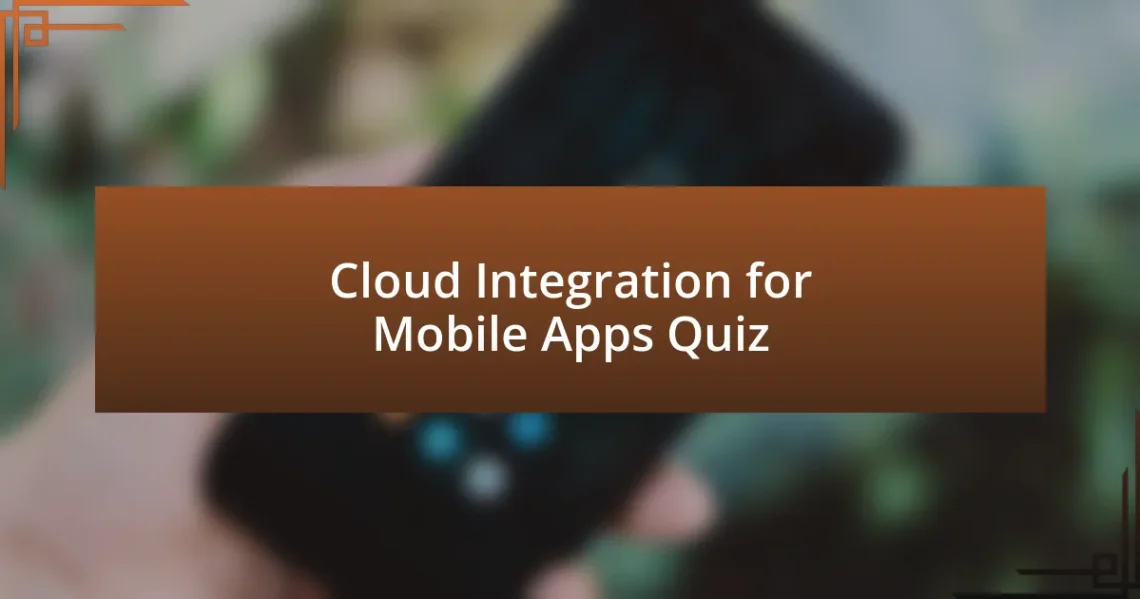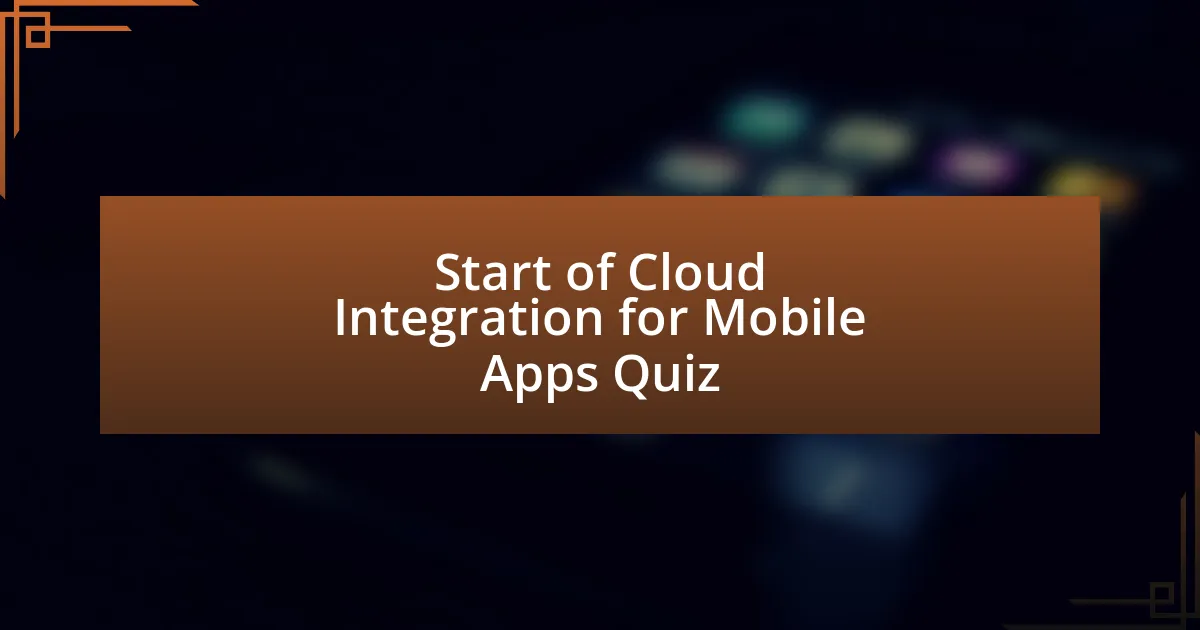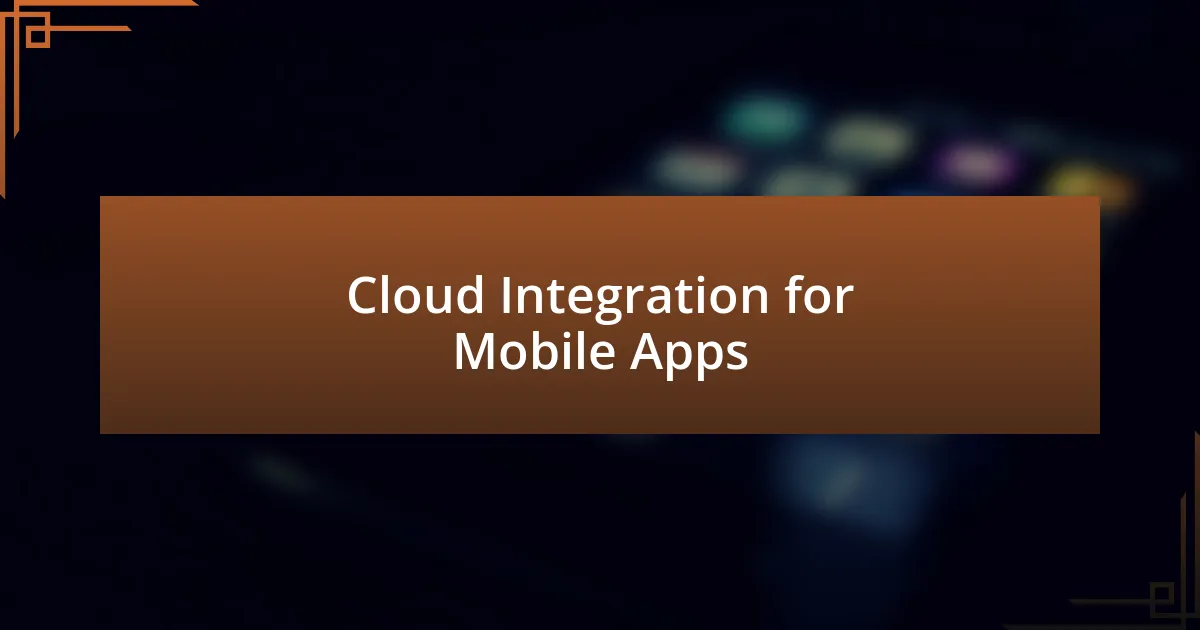
Cloud Integration for Mobile Apps Quiz

Start of Cloud Integration for Mobile Apps Quiz
1. What is the primary benefit of using cloud integration in mobile app development?
- It limits app performance during peak usage.
- It allows for real-time data synchronization.
- It requires extensive offline storage.
- It complicates user authentication processes.
2. Which major cloud platforms are widely utilized for mobile app services?
- Google Cloud, AWS, and Azure.
- Facebook, Instagram, and Twitter.
- GitHub, Bitbucket, and SourceForge.
- Dropbox, Box, and Spotify.
3. How do cloud services assist in managing user data in mobile apps?
- They enable secure storage and dynamic access to user data.
- They provide local processing power for all app functions.
- They prevent real-time updates to user information.
- They limit user data to only offline access.
4. What is mobile cloud computing (MCC) primarily designed for?
- The method of using cloud technology to deliver mobile apps.
- An approach to install apps directly on devices.
- A method for making apps only available offline.
- A technique for improving local storage on smartphones.
5. How can cloud APIs improve user experience in mobile applications?
- They reduce the need for internet connectivity.
- They enable faster data retrieval and processing.
- They increase the size of the mobile application.
- They limit the app`s functionality.
6. What role does cloud storage play in mobile app scalability?
- It limits the scalability of mobile apps.
- It requires constant internet access for functionality.
- It allows dynamic resource allocation to manage user demand.
- It prevents data loss from user devices.
7. How do developers ensure compatibility of mobile apps with different cloud services?
- By using standardized protocols and frameworks.
- By developing apps for each platform independently.
- By avoiding any third-party services.
- By limiting functionalities to offline features only.
8. What are advantages of using serverless architectures in mobile app development?
- Increased need for manual server management
- Dependency on local hardware resources
- Reduced operational burdens and costs
- Higher infrastructure maintenance requirements
9. Which API is commonly used for implementing payment systems in mobile applications?
- Twitter API
- Facebook API
- Google Maps API
- PayPal API
10. How does cloud integration support real-time updates in mobile apps?
- Mobile apps work independently without internet connectivity.
- Cloud integration requires frequent app re-installations.
- Real-time updates are only possible through manual refresh.
- The cloud allows apps to synchronize data and receive real-time updates.
11. What is the impact of cloud-based databases on mobile app performance?
- They improve mobile app responsiveness and load times.
- They rely solely on local device storage and processing.
- They decrease user engagement by limiting features.
- They have no effect on mobile app performance.
12. Why is data security a concern in cloud-integrated mobile apps?
- Cloud services automatically protect all data without any user involvement.
- Data security concerns only arise in traditional desktop applications.
- Data can be compromised due to vulnerabilities in internet connectivity.
- Mobile apps are solely operated on local devices without needing the cloud.
13. How do cloud services facilitate collaboration among mobile app development teams?
- They increase the complexity of team communication.
- They require extensive internet access for all tasks.
- They provide a centralized platform for sharing code and resources.
- They limit access to project files for security.
14. What is the significance of API gateways in mobile app cloud integration?
- They serve as a delay mechanism for data transmission.
- They limit access to mobile app features and services.
- They centralize API management, improve security, and enhance scalability.
- They only facilitate local data storage without processing.
15. How do analytics from cloud services contribute to mobile app optimization?
- By eliminating the need for internet connectivity.
- By storing all app data locally on the device.
- By integrating multiple data points quickly and communicating with several applications.
- By requiring users to manually update app features.
16. What are some common challenges faced when integrating cloud services with mobile apps?
- Lack of internet connectivity
- High device battery consumption
- Security and data privacy issues
- Limitations in screen size
17. How does cloud integration aid in A/B testing for mobile applications?
- Cloud integration complicates the data analysis process.
- Cloud integration exclusively focuses on UI design improvements.
- Cloud integration limits testing to local devices only.
- Cloud integration provides real-time analytics and testing environments.
18. What is the purpose of using authentication services from the cloud in mobile apps?
- To improve battery life on mobile devices.
- To reduce the need for internet connectivity.
- To store all user data locally.
- To enhance security and user management.
19. How does cloud infrastructure assist with app crash analytics?
- It provides centralized logging and real-time error reporting.
- It creates offline functionalities for apps.
- It enhances the graphics performance of applications.
- It stores user data locally on devices.
20. Which cloud technology aids in the implementation of push notifications in mobile apps?
- Push.mobi
- Google Drive
- OneDrive
- Dropbox
21. How can cloud services improve the deployment process of mobile applications?
- They increase the need for manual deployment processes.
- They limit access to application resources.
- They provide secure remote hosting and storage solutions.
- They ensure all data is stored locally on devices.
22. What kind of real-time data can cloud-based APIs provide for mobile apps?
- Manual data entry
- Real-time analytics
- Static content
- Offline storage
23. How do cloud services optimize resource usage during high traffic for mobile apps?
- By utilizing automatic scaling to handle increased requests.
- By requiring users to download more data locally.
- By decreasing the quality of service during peak times.
- By limiting user access to reduce server load.
24. What is one key feature of cloud-based mobile app development platforms?
- Downloads for offline use
- Compatibility with old devices
- Scalability and ease of integration
- Requires high-end hardware
25. How does cloud integration contribute to cross-platform mobile app development?
- It restricts apps to a single operating system.
- It increases the complexity of app development and deployment.
- It allows apps to share data and functionalities seamlessly across different platforms.
- It eliminates the need for internet connectivity in mobile apps.
26. What methods are used to backup data in mobile cloud applications?
- USB flash drives
- Local device storage
- Cloud storage solutions
- External hard drives
27. What is the role of cloud-based CDN in enhancing mobile app performance?
- It exclusively stores user data on local devices.
- It reduces latency and improves content delivery speed.
- It makes applications operate offline without internet.
- It solely focuses on increasing the app`s user interface graphics.
28. How do cloud services impact the lifecycle management of mobile applications?
- They reduce the performance of mobile applications.
- They limit the scalability of mobile applications.
- They streamline the development process of mobile applications.
- They increase the security risk of mobile applications.
29. What advantage do mobile developers gain from using cloud-based AI features?
- They increase battery consumption on devices.
- They improve app performance and functionality.
- They require a constant high-speed internet connection.
- They eliminate the need for mobile development.
30. How do cloud services support the localization of mobile applications?
- By providing resources for data storage and processing.
- By limiting access to certain geographic areas.
- By replacing local servers with one large database.
- By ensuring all app functionality runs offline.

Congratulations! You Have Successfully Completed the Quiz
Thank you for participating in our quiz on Cloud Integration for Mobile Apps! We hope you found the questions engaging and informative. It’s a great way to test your understanding of how cloud technology enhances mobile applications. Many might have discovered new concepts or clarified their existing knowledge about cloud services and mobile app functionalities.
Throughout this quiz, you may have learned about the benefits of cloud integration, such as improved scalability and data security. You might have also explored how different cloud platforms interact with mobile devices. This knowledge is essential for anyone looking to develop, manage, or optimize mobile applications in today’s tech-driven landscape.
We invite you to delve deeper into the fascinating world of Cloud Integration for Mobile Apps. Check out the next section on this page, where you will find comprehensive information that could further enhance your understanding and skill set. Exploring these resources will help you harness the full potential of cloud technology for your mobile projects.

Cloud Integration for Mobile Apps
Understanding Cloud Integration for Mobile Apps
Cloud integration for mobile apps refers to the process of connecting mobile applications to cloud-based services. This integration allows mobile apps to access data and features hosted in the cloud, enhancing functionality and user experience. It enables seamless data sharing between the app and cloud services, which can include storage, databases, and computing power. By utilizing cloud integration, mobile apps can scale efficiently, providing users with real-time access to information and services.
Benefits of Cloud Integration for Mobile Apps
Cloud integration offers numerous benefits for mobile applications. It facilitates data synchronization, ensuring that users have access to the latest information across devices. It improves accessibility, allowing users to interact with apps from anywhere. Additionally, it reduces infrastructure costs as developers leverage cloud resources instead of maintaining extensive on-premises servers. Enhanced security features provided by cloud services further protect sensitive data within mobile applications.
Common Techniques for Cloud Integration in Mobile Apps
Common techniques for cloud integration in mobile apps include RESTful APIs and SDKs. RESTful APIs allow apps to communicate with cloud services over the internet, exchanging data in a standardized format. Software Development Kits (SDKs) offer pre-built code libraries that simplify the integration process. These techniques help streamline development and ensure that mobile apps can efficiently utilize cloud resources.
Challenges of Cloud Integration for Mobile Apps
Cloud integration also presents several challenges for mobile apps. Latency can affect performance, especially in real-time applications. Ensuring robust security measures is critical to protect data during transfer and storage. Moreover, connectivity issues can disrupt access to cloud services, leading to a poor user experience. Developers must address these challenges to ensure reliable and secure cloud integration in mobile apps.
Future Trends in Cloud Integration for Mobile Apps
The future of cloud integration for mobile apps is shaped by emerging technologies. The adoption of microservices architecture is increasing, allowing more flexible development and deployment. Artificial intelligence and machine learning are being integrated for personalized user experiences. Moreover, the rise of edge computing is enhancing data processing speeds by minimizing the distance data travels to the cloud. These trends indicate a shift toward more efficient and responsive mobile applications.
What is Cloud Integration for Mobile Apps?
Cloud integration for mobile apps refers to the process of connecting mobile applications to cloud services to enhance functionality and data management. This integration allows mobile apps to access, store, and synchronize data in real time across different platforms. It enables features such as cloud storage, user authentication, and data analysis, which are essential for providing a seamless user experience and improving app performance.
How does Cloud Integration benefit Mobile Apps?
Cloud integration benefits mobile apps by providing scalability, flexibility, and accessibility. It allows developers to handle large amounts of data without investing in extensive infrastructure. Additionally, features like real-time updates are possible, ensuring users always have the latest information. For example, according to a study by Gartner, organizations can reduce IT costs by up to 30% through effective cloud integration.
Where can Cloud Integration for Mobile Apps be implemented?
Cloud integration for mobile apps can be implemented using various platforms such as Amazon Web Services (AWS), Microsoft Azure, and Google Cloud Platform. These platforms offer tools and services specifically designed for mobile app development, such as cloud databases, storage solutions, and APIs that facilitate seamless connectivity between mobile apps and cloud services.
When is it necessary to integrate Cloud Services in Mobile Apps?
Integrating cloud services in mobile apps is necessary when an app requires real-time data access, user synchronization, or efficient storage solutions. For instance, if an app needs to manage numerous user-generated files or provide constant updates, cloud integration becomes essential. Research shows that apps relying on cloud services can achieve a 40% increase in user satisfaction due to improved performance and availability.
Who are the key players in Cloud Integration for Mobile Apps?
Key players in cloud integration for mobile apps include major cloud service providers like Amazon Web Services, Microsoft Azure, and Google Cloud. These companies offer robust frameworks and tools that facilitate cloud integration. Additionally, software vendors like IBM and MuleSoft provide integration platforms that help connect mobile apps with cloud services efficiently.




